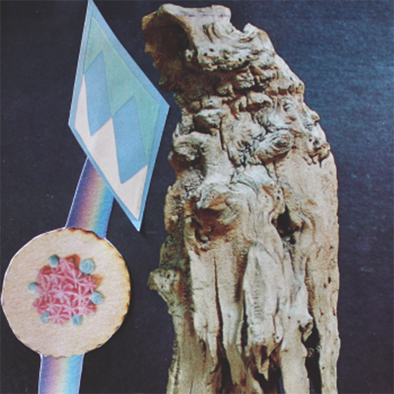 Although my initial enthusiasm for this project has been dampened somewhat by Rachel Evans' deluge of similar-sounding releases, her ambitious and divergent debut for Editions Mego's Spectrum Spools imprint demonstrates that she still has some tricks up her sleeve.  While her characteristic layers of gauze-y, ethereal vocals have not vanished entirely, they are unexpectedly infrequent and rarely take center stage.  Instead, this sprawling double-album plunges headlong into burbling, drifting, and subtly hallucinatory synth-based psychedelia and stays there for a pleasantly long time.
Although my initial enthusiasm for this project has been dampened somewhat by Rachel Evans' deluge of similar-sounding releases, her ambitious and divergent debut for Editions Mego's Spectrum Spools imprint demonstrates that she still has some tricks up her sleeve.  While her characteristic layers of gauze-y, ethereal vocals have not vanished entirely, they are unexpectedly infrequent and rarely take center stage.  Instead, this sprawling double-album plunges headlong into burbling, drifting, and subtly hallucinatory synth-based psychedelia and stays there for a pleasantly long time.
I am certain that it was no arbitrary or casual decision to make this album self-titled, as it has the definite feel of an attempted magnum opus.  While I remain indecisive about whether or not this constitutes Evans' zenith, these are definitely the most massive, deliberate, and complex compositions that I have heard from her.  Well, aside from possibly the "compositions" part, as it is very hard to guess how these pieces originated.  It sure seems likely that there was a lot of improvisation, editing, and rearranging involved though.  That is not a critique–I merely mean that each of these four side-long (20+ minute) pieces is so shifting, vaporous, and amorphous that it seems impossible that Rachel could have fully envisioned and consciously executed the disorienting arc that each song ultimately follows.  While I myself certainly can't remember how most of these songs started by the time they eventually end, there are many oases of memorability and melody in between that sound very much planned, so some intelligent organization certainly occurred somewhere along the line. It is certainly an odd structure, but it works.  Also, it makes sense when I consider Evans' history of cassette releases, as some imagination is certainly required to avoid leaving blank stretches.
Because of the fluid, drifting nature of the pieces and the long running times, so much stylistic territory is covered that it is pretty hard to conclusively summarize or "like" an entire piece.  I could probably do without some of the bloopier, candy-colored, golden-years-of-analog-synthesizer-homage passages, but they are easily balanced out by the alternately dreamy, sublime, breathy, or otherworldly passages that surround them.  I was especially fond of the closing "One Perfect Moment," which begins beautifully with a cool twinkling synth hook that is slowly consumed by warm chord swells and a somewhat damaged-sounding chorus of vocal layers.  The fact that Evans' voice sounds somewhat distorted and broken-up was especially unexpected and welcome, as one of my primary hurdles with Motion Sickness has always been that it is generally too muted and mannered to hit me on an emotional level.  "Moment" corrects that and runs with it, morphing into a hazy drone stretch that becomes increasingly disrupted by washes of hiss and throbbing bass surges.  It eventually loses a little momentum, but I can't stress enough how much more moving Evans' music is when its angelic tendencies are buffeted by harsher and more unpredictable textures.  There are at least 10 perfect minutes in that song and that is a conservative estimate.
I did not expect to like this album nearly as much as I do, but it is weirdly endearing despite its bloat and occasional less-than-great stretches.  Rachel took some significant risks, stepped out of her comfort zone, and managed to sustain it all for a very lysergic and enveloping 90 minutes.  She even managed to paradoxically make bloat and inconsistency seem like virtues, as this album is best experienced as full immersion: were it any shorter, it wouldn't be nearly so absorbing and the odd dodgy patch only serves to heighten the unpredictability and make transitions into the better motifs even more striking.  This probably isn't the ideal first place to start for anyone new to Motion Sickness of Time Travel, as it is both massive and not particularly representative of her past aesthetic, but "One Perfect Moment" might be the single best piece she's ever recorded.  For current admirers, this is absolutely essential.  It has its flaws, but they are largely eclipsed by its vision, enormity, and otherness.
Samples:
 
Read More


